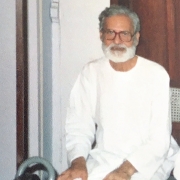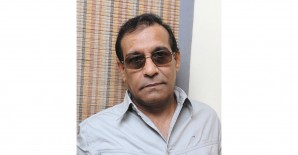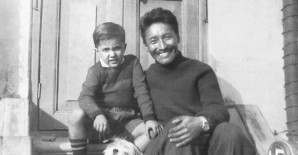
Columns

With World Alzheimer’s Day having just gone by, Humra Quraishi recalls her father’s struggle with the degenerative disease
My father Iqtidar Ali Khan started showing the initial symptoms of Alzheimer’s soon after retirement, but we thought his depression and slight traces of forgetfulness were along the strain of the typical post-retirement blues. However, when he and my mother travelled to London to be with my sister’s family, they realised something was amiss, and that it was more than a routine bout of depression. More so, as one evening he got lost on his way back from Hyde Park; when he was finally traced, he showed no signs of anxiety. It was as if he wasn’t even aware that he had got lost!
It’s then that the family decided to show him to a specialist in London. We were told that he was suffering from Alzheimer’s, and there wasn’t much that could be done in terms of medical treatment to harness deteriorating memory cells. But, yes, ample advice was given on treating the patient with patience and love. Prominent among the ‘dos’ were a caring caretaker and the need to keep the patient in familiar settings, with an unchanging atmosphere and routine.
My father’s depression paved the way for more obvious signs of Alzheimer’s. He started forgetting mundane things such as eating, changing clothes and bathing. More changes followed. He couldn’t coordinate dates with days anymore. And though he had been driving for decades, he couldn’t drive with the same level of confidence. Gradually, he lost sense of direction too. Within months, my handsome and well-dressed father looked all too changed. He disliked bathing, shaving and even stepping out on the outer lawn. My father, who was very particular about going on long drives and to the club for tennis, started looking forlorn, sitting tight like a recluse.
With each passing day, his memory shrank further. In effect, this is what Alzheimer’s disease is all about: shrinkage of memory cells and consequent degeneration. Some battle with it for a few years, others succumb within a short span. In my father’s case, he passed away in the winter of 1996, after a struggle of almost six years. In fact, the degeneration of his memory worsened just months before he passed away. He could no longer sip chai, his favourite brew, or differentiate between toast and butter.
Alzheimer’s is a disease that is yet to find a cure, although it was diagnosed as far back as 1906 by German pathologist Alois Alzheimer, who had noticed changes in the brain tissue of a woman who had died of an unusual mental illness. Her symptoms included memory loss, language problems and unpredictable behaviour.
Alzheimer’s is progressive and degenerative, and those affected by it change drastically—beyond recognition. Their memory becomes ‘polka dotted.’ Only ‘little islands of memory’ remain. With pathological changes in the brain beginning to take place, the affected person undergoes a sharp transformation. Some common symptoms include a gradual loss of memory, decline in the ability to perform routine tasks, disorientation, impairment of judgment, and loss of language and communication skills.
As for my father, worse was to come. He stopped recognising friends and family. He couldn’t even recognise us, his children. He would ask: ‘Aap kaun hain… aapka kya naam hai? His eyes relayed restlessness, as though he wanted to communicate something significant with us. Sometimes he would murmur while recalling some childhood incident. Occasionally, he would burst into tears and sob like a child and go looking for his long-dead mother or siblings.
Though we would be sitting next to him, he seemed oblivious of that. I remember one particular incident that shattered us. We saw him looking for something he seemed to have lost. He moved about, peering under beds, behind sofas and doors. When we asked him what the matter was, he spoke with nervous impatience: ‘Where are my children? I’m looking for them. They’re lost!’
He had been a doting father all along, who helped us with school homework, drove us to the dentist, tailor, tutor …wherever we wanted to go. He was there with us even through our emotionally turbulent adult lives. He was gentle, sensitive and soft-spoken. The family sort, he would wait at the dining table for us to assemble before downing the first morsel. An engineer by profession, he would take us on all his tours; we’d be stuffed in our Baby Hindustan car and driven across farflung rural locales.
For us, it was traumatic to see the transformation in our father’s personality with the onset of Alzheimer’s. The only time he looked somewhat settled and at peace was when we sat close by, holding his hand. Though he didn’t recognise us, our presence seemed to be reassuring for him. Indeed, those with Alzheimer’s need time, affection, love, and gentle care. Sadly, I couldn’t spend much time with my father since he was located in a different city. To this day, it remains one of the biggest regrets of my life.
Quraishi is a Delhi-based writer, columnist and journalist
Photos courtesy: Humra Quraishi Featured in Harmony — Celebrate Age Magazine October 2018
you may also like to read
-
Mental workout
Mukul Sharma tells you how to keep those grey cells ticking Everyone will ultimately lose his or her brain….
-
Helpline
Dr Harshbir Rana answers your queries on personal and social issues related to ageing, elder care and intergenerational relationships ….
-
Off the cuff
Raju Mukherji pays tribute to his first hero, Tenzing Norgay, an exemplary mountaineer Darjeeling, 1955. Dr ‘Pahari’ Guha Mazumdar….
-
Yoga RX
Shameem Akthar shows ways to control debilitating ankle pain through regular practice Ankle pain is so common and prevalent….








